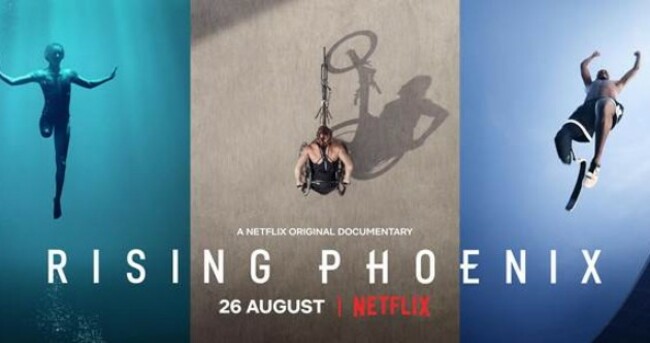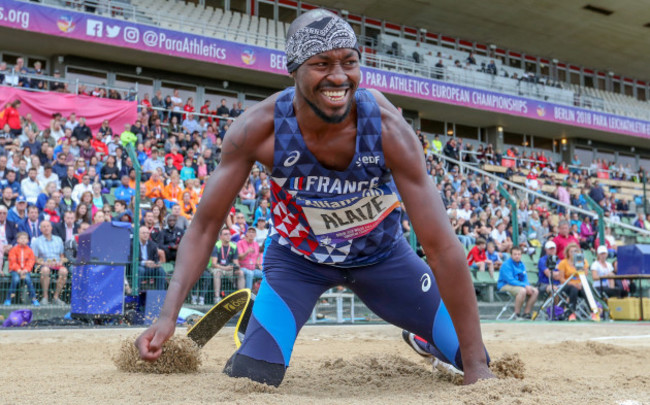IN AN AGE where doping, corruption, abuse and morally dubious political figures regularly make headlines, it is easy to feel disillusioned with sport.
The new Netflix documentary, ‘Rising Phoenix,’ serves as a timely reminder as to why we love it in the first place.
The film, which was released on Netflix this week, is packed with inspirational tales of athletes who have overcome various forms of misfortune in life to become top Paralympians.
It also charts the history of the Paralympic Games, from founder Ludwig Guttman’s initial project to help wounded soldiers’ rehabilitation back in the 1940s to the modern-day phenomenon that has been created, focusing particularly on the remarkably successful London 2012 Games and the more problematic Rio 2016 event.
Nine current Paralympians are profiled, including Italian fencer Bebe Vio (whose arms and legs were amputated as a result of meningitis), Australian swimmer Ellie Cole (whose leg was amputated due to cancer and who initially used the sport primarily as a form of rehabilitation), French runner Jean-Baptiste Alaize (who lost a leg in an attack when fleeing the civil war in Burundi at the age of three), US/Russian wheelchair racer Tatyana McFadden (the most celebrated Paralympian of all time and an ‘Americans with Disabilities’ activist), British gold-medal-winning sprinter Jonnie Peacock, and the world champion archer, who uses his feet rather than his hands, Matt Stutzman.
It’s difficult not to be moved by these inspirational athletes’ stories. Some of the most touching moments involves footage of them growing accustomed to their disabilities as children, as well as their parents’ emotional recollections of the various challenges they faced.
‘Rising Phoenix’ is directed by Ian Bonhôte and Peter Ettedgui, who took on the project partially because it was starkly different from the previous film they worked on together — the 2018 biographical work about the acclaimed designer Alexander McQueen, whose tragic suicide at the age of 40 stunned the fashion world.
“It felt like it could be something much more than just a historical documentary and something that was very clearly going to be a very powerful, emotional subject,” Ettedgui tells The42.
We were always saying: ‘Wouldn’t it be great if we could do a sports film.’ But we never found a sports story that really engaged us and we suddenly thought ‘this story,’ because it’s not just a sports story. It’s also human rights, it’s also the story of athletes who have confronted tragedy or trauma, or have been born with some physical anomaly that has made them a total misfit. Yet they’ve come through all that, they’ve incorporated it into their lives and found a power or gift — they can use this apparent disability to transform their lives in some way, and that really spoke to both of us.”
The film’s release had been originally planned to coincide with the start of the Tokyo Paralympic Games, but of course, the coronavirus forced the postponement of the latter until August 2021.
While Netflix might have been hoping to capitalise on a time period when media attention and interest in the Paralympics was at its highest, the directors believe the lack of sport at present is not necessarily detrimental to their film’s prospects.
“I have a theory — people might disagree and our producers surely will disagree,” Bonhôte says. “Basically, when we were working on ‘McQueen,’ our distributor was saying ‘amazing, you’ve got a documentary about a fashion designer, let’s put it out during fashion week, because you’ll have a load of fashion people interested’.
What happens is that all these people for 4-6 weeks are constantly in the world of fashion and having to watch fashion shows. I did feel, and I think Peter would agree, all the athletes and the teams will be focusing on this amazing event, the Olympics and the Paralympics, which are extremely hard to put on, the accumulation of years of blood, sweat and tears, a huge amount of financial, family, broadcaster and sponsors’ investment. So for all them to suddenly stop and watch a Paralympic film, I felt, wasn’t the right time, because they’d be focusing on winning medals.
“I feel it’s a blessing in disguise, because if the Games happen next year, we almost have a longer life with the film. They’ve all this year to appreciate it as a preamble, building up the characters, so maybe the audience will be even more excited to see it in the future.”
Ettedgui adds: “Also, in terms of the audience: ‘Why would I watch a film about the Paralympics, when I can watch the Paralympics?’”
Selecting nine athletes from the 4,400 expected to compete at Tokyo was an unenviable task. But with the help of a dedicated research team, it was narrowed down to a select few individuals.
“We could have made 20 other movies with 10-12 different athletes,”Ettedgui explains. “How we got down to the final group, we wanted to get diversity in that. Not just diversity in terms of skin colour, but also global diversity in the film.
“We wanted to get different kinds of stories of how people acquired their disability, whether it was from birth or illness, or an accident, or war in the case of Jean-Baptiste Alaize.
“We wanted different stories, different sports, balance of gender, all of those things came into play. We obviously looked at interviews for people we were interested in. We read about them. So it was about great stories, and who was able to tell those stories in a way that could be compelling onscreen.
“And then there were those little moments. We hadn’t really come across Bebe Vio — at least, she was one of 500 names.
“Then we saw that little bit of the gold medal match [at the Rio Games] where she wins the final point and you see the emotion coming out of her. And we just thought: ‘She’s obviously got to be in the film.’”
Bonhôte continues: “We still had to reach out to people. It’s not like everyone was going to say: ‘Oh great.’ This film had the blessing from the International Paralympic Committee. They were going to try to bridge those contacts. Jonnie Peacock seemed interested, but he didn’t say ‘yes’ within a second, we had to try to work on getting him. Bebe and everybody else was the same.
“There is something amazing within that world where there’s a complete lack of pretentiousness. All of these people generally have set up a charity. They really want to spread the word. They really want people to know what they’re doing, not in an egoistic manner, because they’ve never been treated like superstars, which they should be, because they’re amazing athletes. I always like to say, you take Lionel Messi and you just film him normally, he’s small, not extremely good looking, doesn’t speak very well, but he plays football very well.
When we talked to all of these people, everyone was super smart and having had to fight a certain way, very savvy and tuned in. When you reach that quality of sportsmanship, you push your body to its limits and your body is already broken a few times through disease, accidents, or whatever it is. We had to work a little bit to convince them to come onboard for this project. They had to give us two days generally minimum, because we had the movie moments and then the interview, so there was a lot to do.”
Taking the athletes out of their busy schedule and making them understand that the interview process was different and more in-depth compared with the average two-minute spot on local news were further challenges, as was shooting the documentary’s especially movie-like moments.
“It took them a while,” Bonhôte says. “‘Okay, so you want me to run in a small rural village right next to a cheetah? You want me to get into that very nice, sexy, golden swimsuit and just swim around?’ Our approach was slightly different. ‘You want me in a warehouse in Japan, wheeling around and pretending I’m going to be hit by a strange force?’ They had to go with us, they had to trust us.
“They started trusting us when we went on to do the shoot. Ntando Mahlangu, we had two days with him, in a disused dirty warehouse in downtown Johannesburg, this dangerous area for everyone and anyone. We were making him stand in a poodle of water, smelling of pigeon, poo and pee. It reminds me of times where you do videos and you put some famous artist in a situation they would not [normally put themselves in], but they’re doing it because they trust you. Otherwise they wouldn’t be doing it.
“And they have to have fun doing it. That’s the magical thing of our approach. We make things slightly different, so it’s not a usual documentary. ‘Oh, I’m training, or I’m running fast.’”
London 2012 is cited in the film as a watershed moment for the Paralympics. Previous Games had been less high profile and were often marred by disappointing attendances. Why was that the particular occasion when the event’s popularity exploded? The greater athlete exposure that the internet now enables and the improved TV coverage and production values are undoubtedly significant factors, but there is something deeper at play too.
“If you read a lot of sports articles, now the audience don’t want only the slick package,” Bonhôte explains. “They like to know that there was a struggle. There’s a story behind it. There’s something that gets you somewhere. With every Paralympian, there’s a story. And it’s a different story. The story might not have affected them massively, but the people around them [were impacted]. Because when parents have to make a decision on amputation at two or three years old, the two or three-year-old doesn’t have a choice to make. They will live with that choice, but the parents have to make that choice.
“I think sport these days is almost not enough. The Olympics is great. ‘Usain Bolt has run really fast. 100 metres in 9.76 or 9.75.’ Who gives a fuck about that? Excuse my French, but the fact that someone gets to run potentially having been in a war zone, it becomes so much bigger than just sport and sport really takes its place. It’s not just about money. It’s not just about fame, or wearing the right sports gear, or representing your country. You stand alone as a representation of survival and exceptional abilities in pushing your body to the next level.
“You can push your body and use your abilities creatively, and sport does that with the physical abilities, and I think this is extremely inspiring and touching, and I love it, it makes us move. Peter and I love football, because someone that Peter knows very well says: ‘If you can give the same amount of emotion in a movie between crying, winning, happiness, excitement, fear, you generally [have done a good job].”
Ettedgui continues: “The thing about the Paralympics that people discovered in 2012 is it’s the underdog story, it’s not the Olympics, the Olympics is the big ‘I am’. The refreshing thing is people could discover these heroes for the first time. They weren’t being told, you have this guy: ‘He’s a superstar. He’s the greatest thing.’ Everyone could discover an athlete, a country, a sport, in a different way.
Also, what you see vividly in the Paralympics, sports fans all have this ideal that it’s intensely competitive and it should be, but there’s a sense that people were in it together — the Paralympics has that. All of our athletes would say to us, it is amazing when you get to the Paralympics, you meet people from all over the world that you met in different tournaments together as a team. Even though you’re competing against each other, you’re doing something together.
“And that’s where Jean-Baptiste Alaize started riffing on the idea of ‘Avengers Assemble’. We didn’t ask him to make an analogy to superheroes. We just asked: ‘What’s it like to be at the Paralympics?’ He said: ‘Have you seen ‘Avenger Assemble’? It’s like that. There are these special skills that we’ve honed and worked at, and yet we’ve always been treated a bit like outsiders, because of our disabilities.’
“‘We come together and we do something that saves human kind.’ He means it in a sense of changing people’s attitudes, making the world a better place, making the physical environment more accessible for other people, not just Paralympians, but for anyone with a disability. Changing the world for the better in that sense. I think that’s what makes it, for us, so exciting.”
Rising Phoenix is now streaming on Netflix












The very best of luck to her.